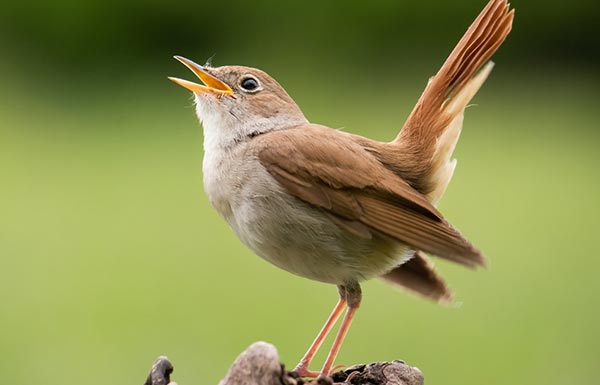Birds communicate in fascinating ways, using chirps and songs to convey messages. Chirping, a simpler form of communication, serves to warn of danger and facilitate communication. Both male and female birds chirp, each with their unique patterns. On the other hand, birds’ singing, which is sweet and melodious, helps male birds attract mates during mating seasons. These songs also mark territories, with males using them to establish and defend their areas. Overall, birds’ vocalizations are crucial for their social interactions and survival.
Why Do Birds Chirp At Night?
Hearing birds at night can mean a variety of things:
- Attracting Mates
Male birds often chirp and sing songs at night, especially during the breeding season when they are seeking a mate. However, nighttime chirping and singing can occur at other times of the year for various reasons. These sounds can range from simple chirps to melodious songs. Spring is the season when most birds breed, and nighttime chirping is common among both diurnal and nocturnal birds. - Danger
Bird noises at night also means they are signaling other birds to potential dangers. For instance, if a bird hears loud or strange noises nearby or senses a predator nearing their nest, they will chirp loudly to warn others. Additionally, when one bird starts others join in, creating a louder noise that can frighten predators away. - Finding the Flock
During migration, birds often become separated from their flock while flying at night. To stay together and help lost birds find their way back or keep everyone safe, they chirp as they fly. Additionally, these birds produce loud flight calls as they travel to new areas. This helps signal to other birds that need to join the migration that the flock has arrived. This loud chirping ensures their calls can be heard from a distance. - Disorientation
Birds also chirp at night due to disorientation caused by light. Like humans, light can disrupt birds’ sleep patterns and affect their functioning during the day, confusing them. They mistake artificial lighting for sunlight, thinking it’s daytime. This confusion is exacerbated by light pollution, which disrupts birds’ natural patterns and behaviors Additionally, noise pollution plays a role. During the day, loud noises such as car horns, construction, and concerts can drown out birdsong. At night, when these noises diminish, birds find it more peaceful to chirp. - Song Practice
Why do birds chirp so much? Another reason is that they practice their songs and improve their singing skills. Despite their natural ability to make pleasant sounds, they practice to enhance their skills. Younger birds often imitate their parents while practicing their songs. Northern Mockingbirds, for instance, can be particularly vocal at night. - Food
When birds discover food, they react with excitement and make noises. However, it’s important to note that they chirp out of excitement, not because they’re feeding. While most birds don’t feed at night, some species do. These nighttime feeders chirp when they find food. This signals to other birds about the new food source. - Baby Birds
Human babies and baby birds share a need for intense protection and care from their parents. Baby birds, like human infants, are unable to survive on their own until they reach a certain age. They require constant supervision and protection from their parents. If the parents leave the nest, baby birds will chirp both during the day and at night, seeking protection and assistance. Additionally, baby birds mimic their parents’ sounds to practice important survival skills. They chirp when they need something, such as food, comfort, or protection.
Do Hummingbirds Chirp?
Hummingbirds chirp to communicate various messages such as food locations, dangers, and mating signals. These sounds can vary in meaning depending on the species, age, and gender of the hummingbird. They produce these sounds from their throats, and their wings create a humming noise as they move, giving them their name. Some hummingbird species also make a loud chirp with their tail feathers, known as a sonation.
How Do Birds Hear?
Birds depend on their excellent sense of hearing to detect prey and recognize other birds by their songs. They have better hearing detail than humans, despite lacking the external ear structure humans rely on. Instead of external ears, birds have funnel-shaped openings behind and slightly below their eyes, protected by soft feathers called auriculars. These openings function as their outer ears. Inside, birds have inner and middle ears, similar to humans.
Conclusion
Understanding the language of birds reveals that their chirping is vital for communication. They chirp to warn of dangers, attract mates, find their flock, and practice songs. At night, they chirp sometimes due to light confusion or to communicate. This communication is crucial for their survival and social life, showing how complex and important bird behavior is.

Thank you for your sharing. I am worried that I lack creative ideas. It is your article that makes me full of hope. Thank you. But, I have a question, can you help me? https://accounts.binance.com/es-MX/register-person?ref=GJY4VW8W